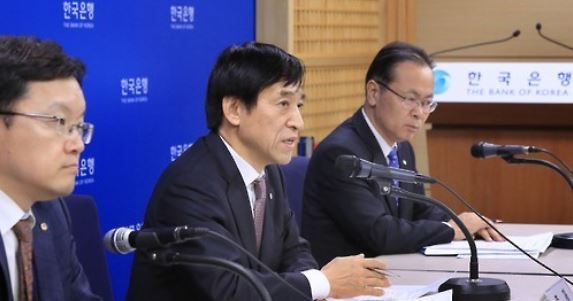BOK chief says uncertainties heightened over N. Korea risks
By YonhapPublished : Aug. 31, 2017 - 16:03
The head of South Korea's central bank said Thursday that the North Korean risk factor has raised uncertainties for Asia's fourth-largest economy.
Tensions on the Korean Peninsula have been escalating over North Korea's long-range missile and nuclear programs.
On Tuesday, North Korea fired an intermediate-range ballistic missile that flew over Japan in what North Korean leader Kim Jong-un says was a prelude to containing the US Pacific territory of Guam.
The missile launch drew strong UN condemnation and prompted US President Donald Trump to warn North Korea that "all options are on the table."
"There is very high uncertainty over geopolitical risks, though the domestic economic growth is expected to sustain a favorable pace going forward," BOK Gov. Lee Ju-yeol said in a news conference.

His comments came after the central bank's Monetary Policy Committee voted unanimously to keep its policy rate at an all-time low of 1.25 percent, extending its wait-and-see approach for the 14th consecutive month.
In June, BOK Gov. Lee Ju-yeol said the central bank may take a monetary tightening approach if the economy shows signs of robust recovery, a signal that the central bank may consider a rate hike over the long haul.
The BOK said a worsening of the trade environment with China and geopolitical risks related to North Korea are the main downside risks facing the South Korean economy.
China has carried out a series of economic retaliations against South Korea, including a ban on group tours to South Korea, in protest of the deployment of an advanced US defense system in South Korea. Beijing has repeatedly pressed South Korea to withdraw the anti-missile defense system, claiming the deployment could hurt Beijing's security interests.
Lee said the South Korean economy could sustain its improvement trend on the back of a global economic recovery and the implementation of an extra budget.
In July, the National Assembly passed a 11.03 trillion-won ($9.9 billion) extra budget bill meant to create jobs and spur economic growth.
Still, he cautioned that it's difficult to predict what impacts tensions over North Korea's nuclear and missile programs could have on South Korea's economy as North Korea risks are a very "delicate and complicated matter."
Lee said that going forward, domestic economic growth is expected to be generally in accordance with the path projected in July.
Last month, the BOK raised its growth outlook for South Korea's gross domestic product to 2.8 percent for 2017, up 0.2 percentage point from the central bank's estimate released in April.
The central bank is set to release its revised estimate on the country's economic growth in October.
"Consumption will likely continue its moderate trend of recovery, due to the improvement in employment conditions and the execution of a supplementary budget," the BOK monetary policy board said in an English-language statement.
The central bank said exports are expected to fall below the July projection, however, as service exports have slowed owing to a decline in the number of foreign tourists, while construction investment will probably also be less than forecast, as a consequence of real estate market stability.
Also Thursday, Lee called for consistent efforts to rein in rising household debt, but he cautioned that a drastic reduction in the pace of growth in household debt could have a negative impact on the economy.
South Korea's overall household debt came to 1,388.3 trillion won ($1.22 trillion) as of end-June, up 10.4 percent from a year earlier, according to data compiled by the BOK. (Yonhap)








![[Kim Seong-kon] Democracy and the future of South Korea](http://res.heraldm.com/phpwas/restmb_idxmake.php?idx=644&simg=/content/image/2024/04/16/20240416050802_0.jpg&u=)








![[KH Explains] Hyundai's full hybrid edge to pay off amid slow transition to pure EVs](http://res.heraldm.com/phpwas/restmb_idxmake.php?idx=652&simg=/content/image/2024/04/18/20240418050645_0.jpg&u=20240418181020)

![[Today’s K-pop] Zico drops snippet of collaboration with Jennie](http://res.heraldm.com/phpwas/restmb_idxmake.php?idx=642&simg=/content/image/2024/04/18/20240418050702_0.jpg&u=)